This year, the Klarafestival will celebrate the inspiration, imagination, and creative power of humanity. And what better way to do this than with the savoir-vivre of Gustav Mahler, from whom this edition has also taken its title, “Alles wieder gut”. We spoke to conductor, trained pilot, and Mahler expert Daniel Harding, who is coming to Brussels with his Orchestre de Paris for a performance of the Austrian composer’s ninth symphony.
Daniel harding makes Mahler great again
Who is Daniel Harding?
• was born in Oxford in 1975
• sent a tape to Simon Rattle, at 17 years old, on which he conducted a self-assembled little orchestra of schoolmates
• became Rattle’s assistant at 18, and later of Claudio Abbado • was the youngest conductor ever to direct a Proms concert in London (1996)
• has been the principal conductor of the Mahler Chamber Orchestra and has frequently collaborated with the London Symphony Orchestra
• has frequently conducted at the Scala and has directed some of the greatest orchestras, including the Wiener and Berliner Philharmoniker
• is now the principal conductor of the Orchestre de Paris and the Swedish Radio Orchestra.
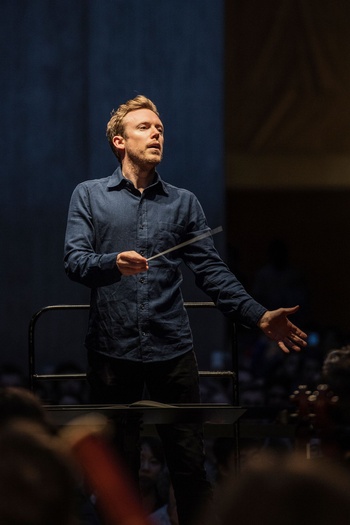
© William Beaucardet
| Daniel Harding, conductor and trained pilot: "When something goes wrong in the cockpit, you have to observe things for a few seconds and never lose your focus. That kind of calm is helping in dealing with musicians."
Daniel Harding is only 42, but has been a successful orchestra conductor for half his life. When he was only eighteen, he became the assistant of Simon Rattle, the English conductor in charge of the Berlin Philharmonic. He conducted that orchestra by himself for the first time at 21, and he is now the musical director of the Swedish Radio Symphony Orchestra and of the Orchestre de Paris, which he will leave at the end of the 2018-2019 season.
When we called him, he still had two long rehearsals to go to before conducting an evening concert of Mahler’s ninth symphony and the new viola concerto by Jörg Widmann. The concert programme premièred at the Philharmonie in Paris and is coming to Brussels for the Klarafestival after a long tour. In the meantime, Daniel Harding found time for a generous conversation.
How do you manage to stay so energetic on long days when you have to peak late in the evening?
Daniel Harding: It takes years of practice. We have just rehearsed Mahler’s complete symphony. It requires extreme concentration to get every detail right. On the other hand, you must ensure that you don’t overburden yourself physically or emotionally during symphonies that are an hour and a half long, like this one.
There is a certain objective distance during the rehearsal. Your analytical ear does the work. You have to protect yourself. It is not easy with Mahler’s powerful music. He is a musician who sweeps you off your feet, it is a glorious state of mind, but in that state, no work gets done. Rehearsing just before a concert is like lighting a fire: if you have positioned all the blocks of wood correctly beforehand, all you need to do for the concert is light the match and let sparks fly.
Can you let yourself go emotionally during a concert?
Harding: You have to stay alert to what you are hearing at each moment and to what you will hear five seconds later. It is a big challenge to be completely immersed in the music and yet to retain a critical ear. If you simply allow yourself to drift away in the beautiful sounds, it makes you too lenient. If everything goes well, the audience can lose themselves in the music, but in the meantime the orchestra keeps the “beast” under control.
Death was one of Mahler's great fascinations. But isn't his music simply bursting with life?
Mahler is a dominant presence at the Klarafestival. The festival’s title, “Alles wieder gut”, is drawn from one of his songs, and both your Orchestre de Paris and the Rotterdam Philharmonic will play his work. He seems to be as popular as ever, though his music is not easy.
Harding: I have no easy explanation for that. It is something I think about a lot: perhaps we are all just obsessed with Mahler. We perform him too often, and I include myself in that, along with all conductors. It hasn’t always been this way, however. Fifty years ago, he was still classified as “obscure music”.
My great-aunt once gave me a dictionary of classical music from 1906. It claims: “Mahler is a talented conductor, but as a composer he has little inspiration and will never write any great successes.” I know of no other composer who is so popular and yet has such profundity as well. And his success has continued in numerous countries for a few decades now. I think it is related to the extremes in his music. It appeals to the audience directly. Mahler is my great love.
A piece of music that lasts ninety minutes. In 2018, when the attention span is becoming ever shorter thanks to our smartphone addiction. Can you sense that in the concert hall?
Harding: I don’t think it is noticeable once you are inside the hall. When you have started the journey, it is over before you realize. The music’s argument is so persuasive that it keeps the listener captivated. I can imagine that it might be quite intimidating beforehand: can I listen to 90 minutes of intense music after a stressful day at work? But once the audience is in the hall, there are no concentration issues.
Mahler’s ninth is his last complete symphony. At that time he had been diagnosed with heart disease and told that he did not have long to live. Is it a bitter or stoic farewell?
Harding: Death was one of his great fascinations. In his very first symphonies, the thirty-year-old composer was already confronting us with allusions to death. I prefer to turn the question around: isn’t Mahler’s music simply bursting with life? In fact, he had already said goodbye in his previous piece, Das Lied von der Erde.
The sense I get from the ninth symphony is more like: “Hey, I’m still here.” It begins tentatively, but then there is an outburst of joy: a composed cry of vitality. Leonard Bernstein described the end of the symphony as a depiction of death, but that is not how I interpret it. I see it as the acceptance of the human condition. For him, life seemed to continue despite it all.
When something goes wrong in the cockpit, you have to observe things for a few seconds and never lose your focus. That kind of calm is helpful in dealing with musicians.
During the concert, Mahler’s work will be preceded by the new viola concerto by Jörg Widmann. Do these two composers make good bedfellows?
Harding: Yes, I think they’re an ideal match. Widmann has written a very theatrical piece. It is not just good music, but a scenic event with plenty of humour. The music begins very lightly, but towards the end, it becomes very deep. In other words, it is the perfect preparation for Mahler’s ninth.
It is often difficult for new compositions to survive their initial launch. Widmann does not seem to have this problem. Soloist Antoine Tamestit has already performed it fifteen times. The Royal Concertgebouw Orchestra is also playing music by Widmann at the Klarafestival.
Harding: Our orchestra has already played the viola concerto five times. We have recorded an album that includes this piece, and during the tour that will end in Brussels, we will perform it six more times. The piece immediately sucks you in. Widmann is a kind of musical superman: an excellent clarinet soloist who remains a musician while he also composes. He explores all the possibilities of an instrument without being showy. He challenges both the audience and the musicians, and yet the dominant sense is always joyful. As far as I am concerned, he is one of the very best active composers.
Your orchestra will perform during the Klarafestival. Is there any difference between a festival audience and an ordinary concert evening?
Harding: A festival is an opportunity to hear many concerts in a short time. This intense experience makes the atmosphere in the hall extra exciting. But I enjoy ordinary concerts just as much. There is something beautiful about the idea that a concert can simply be part of everyday life, just like a nice meal. Concerts are part of the routine of a good life.
The Festival van Vlaanderen Brussel, the organization behind the Klarafestival, is celebrating its 50th anniversary, just like your Orchestre de Paris did a few months ago. The late 1960s must have been optimistic times for classical music. Is that optimism still palpable?
Harding: I am an optimist in every respect, but these are difficult times. Things that were generally accepted are now being questioned. This is happening in every sector, not just in classical music. There is a great fear of that shift. Due to the speed of these changes, we are caught in the maelstrom. But maybe there is a more balanced and restful situation somewhere on the horizon.
As an optimist, I do experience this questioning as a positive challenge. What we do as musicians is expensive. And I do not only mean the financial aspect. Playing classical music, especially as a full orchestra, demands enormous logistical efforts and the energy of dozens of people. It is only right that people address that. If you genuinely believe in what you are doing, you aren’t afraid to defend it. The challenge is to be dynamic, both in making music and in communicating about what we’re doing. By engaging with this exercise, we also renew our passion. Questioning yourself as a musical institution ensures that you will not simply play the same thing as the year before. That is an opportunity, not a threat.
You were only 18 when you became the assistant of Simon Rattle, the English conductor of the Berlin Philharmonic and musical director of the London Symphony Orchestra. Many other conductors only debut when they are in their forties. What were the benefits for you?
Harding: In hindsight, it was a very good thing. Learning to conduct takes a lifetime. Take Mahler’s ninth, for example: the first time I conducted it was 16 years ago. I can imagine that the performance was not the most spectacular. I am now 42, and I use the experiences I have acquired over the past 20 years every day.
In relative terms, I am still a young conductor, but I have already enjoyed a long and eventful career. I have occasionally accepted jobs that I realize in hindsight I should have rejected, because I was launched too young. But my permanent appointments have been quieter: I spent many years with a Norwegian orchestra and with the Mahler Chamber Orchestra. I have been the musical director of the Swedish Radio Choir for the past 11 years. I was not the kind of young conductor who would fall head over heels to direct one top orchestra after another.
In addition to conducting, you recently completed your training as a professional pilot. Are any of those skills useful in concert life?
Harding: It does help to assess situations better. When something goes wrong in the cockpit, you have to observe things for a few seconds. It is the clear-headedness never to lose your focus in a crisis situation. That kind of calm is helpful in dealing with musicians. Due to their passion for the job, they can sometimes react emotionally and stubbornly.
The discipline of observing your behaviour is something that I take from the cockpit to the orchestra. It is also good to have another passion besides my work as a conductor. Otherwise you get caught up in the fear that conducting is the only thing in your life. Having two parallel lives, as a conductor and as a pilot, has made me a happier person.
> Klarafestival. 9 > 30/3, various locations.
Read more about: Brussel , Muziek , Klarafestival , Mahler
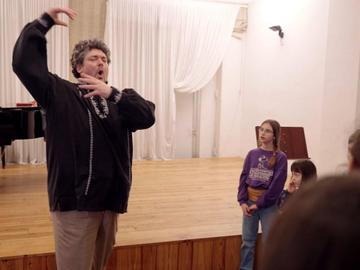
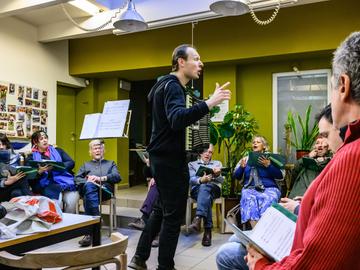
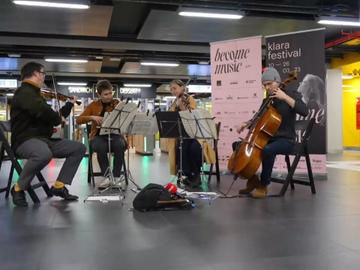
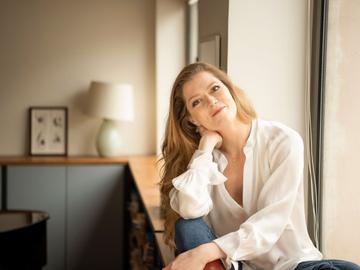
Fijn dat je wil reageren. Wie reageert, gaat akkoord met onze huisregels. Hoe reageren via Disqus? Een woordje uitleg.